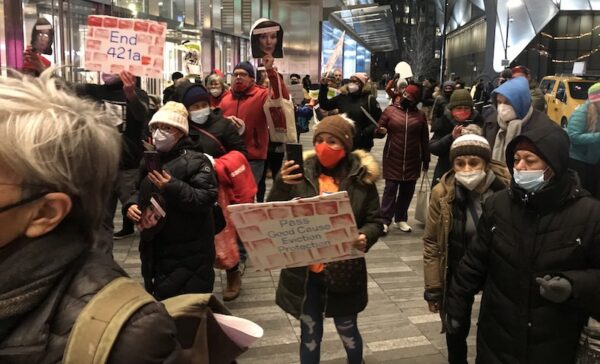NEW YORK, N.Y.—Fourteen labor unions have signed a letter urging state leaders to enact a bill that would prohibit landlords from evicting tenants without a specific “good cause.”
“Too often, though, the wage gains our members win at the bargaining table are wiped away by the escalating cost of rental housing,” said the letter, dated March 9, and addressed to Gov. Kathy Hochul, State Senate Majority Leader Andrea Stewart-Cousins, and Assembly Speaker Carl Heastie. “The sad reality is that when workers miss too many days of work because they have to appear in eviction court, or when they are forced to move too far away from their jobs to find an affordable place to live, they can lose their jobs.”

As the state’s moratorium on evictions during the pandemic expired in January, it added, “Good Cause is what is needed to protect working-class tenants from price-gouging, speculative displacement, and discriminatory evictions. It allows landlords to recoup a fair investment in their properties and pursue nonpayment and other necessary eviction cases.”
The 14 unions are 1199SEIU; American Federation of Musicians Local 802; Association of Legal Aid Attorneys (UAW Local 2325); Committee of Interns and Residents of SEIU; Communication Workers of America District One, District Council 37, Legal Services Staff Association (UAW Local 2320); Local One IATSE NYC Stagehands PAC; the Hotel and Gaming Trades Council; New York State Nurses Association; New York Taxi Workers Alliance; the Professional Staff Congress; United Auto Workers Region 9A; and Workers United/SEIU’s New York-New Jersey Regional Joint Board.
The letter has not yet been formally sent, said Cea Weaver, campaign coordinator of the Housing Justice for All coalition. They are trying to recruit more unions, and “1199 is driving it,” she told LaborPress.
What’s in the bill
The bill, sponsored by Sen. Julia Salazar (D-Brooklyn) and Assemblymember Pamela Hunter (D-Syracuse), would define eight specific reasons for a legal eviction, including not paying rent, damaging the property or creating a nuisance for neighbors, and using the apartment for illegal purposes. It would apply to all rental housing in the state “except for owner-occupied premises with less than four units.”
Rent-stabilized tenants have the right to renew their leases automatically when they expire, but more than 1.6 million renter households do not. They include all tenants upstate and in Suffolk County who are not in certain forms of subsidized housing; those in New York City and the inner suburbs in buildings too small [less than six units] or too new [built since 1974 without certain subsidies] to be rent-stabilized; and those in the estimated 300,000 apartments deregulated under the loopholes in rent stabilization enacted in 1994 and 1997 and repealed in 2019.
In unregulated units, there are no limits on how much landlords can raise rents once the lease expires, and the owner can also refuse to renew the lease without giving a reason. In those situations, tenants who want to stay rarely have any viable legal defense against being evicted, says Legal Services Staff Association political director Natalie James.
To prevent landlords from forcing tenants out when their leases expire by raising the rent, the bill would declare increases of more than 1.5 times the previous year’s inflation rate (or 3%, if inflation is low) “unreasonable,” but owners could argue in court that the increases were necessary to cover expenses such as repairs or property taxes.
Mark Mishler, Sen. Salazar’s legislative director, told LaborPress that her office was “thrilled” by the labor support, “because this is an issue that affects working people across New York State.”
There was some disagreement among housing activists and unions about when the most effective time to send the letter would be. Some wanted to wait until after the state budget, due April 1, had been enacted, when the Legislature would be more likely to pay attention. Others felt that between opposition from the real estate lobby and the budget and other issues competing for legislators’ priorities, “it was important to show labor support.”
The question was moot after Gothamist reported on the letter March 14.
The Albany landscape
The bill has not received a committee hearing in either house since it was introduced for the second time in January 2021. Neither Gov. Hochul, Majority Leader Stewart-Cousins, nor Speaker Heastie have taken a clear position on it publicly, although Heastie’s behind-the-scenes opposition got an earlier version deleted from the 2019 Housing Stability and Tenant Protection Act, the law that repealed most of the loopholes in rent stabilization. Stewart-Cousins’ office did not respond to phone and email messages.
The Legal Services Staff Association supports the bill, James says, because “a large proportion of our practice is in housing,” representing low-income tenants facing eviction. It would be “a sea change for so many of our tenants.”
When tenants don’t have the right to renew their lease, landlords can easily retaliate against them if they complain about conditions such as lack of heat, she adds. One of her coworkers who is a housing attorney lives in an unregulated building with his pregnant wife, and when he filed a complaint about lead paint in the apartment, the landlord filed an eviction case against him.
Major real-estate trade groups such as the Real Estate Board of New York have been referring reporters to Homeowners for an Affordable New York, a front group with a one-page website. It argues that the good-cause bill “would only allow landlords to deny a lease renewal under very limited circumstances,” “will lead to significantly higher rents on vacant units and will have almost no impact on what current renters pay,” and would turn owning and renting property “into a money-losing proposition.”
James dismisses those arguments as “complete fear-mongering.” In New Jersey, which has had a good-cause law on the books since 1974, she says “new residential construction has consistently outpaced New York’s on a per capita basis for years.”
California and Oregon both enacted good-cause laws in 2019, as have the upstate cities of Albany, Beacon, Kingston, Newburgh, and Poughkeepsie during the past year. The Rochester City Council, however, rejected one on March 15. New Hampshire and the cities of Washington and Seattle have similar laws, with Seattle’s in effect since 1980.
In Albany, however, the issue is politically sensitive. The bill’s list of cosponsors — 22 out of 43 Democrats in the Senate and 58 out of 107 in the Assembly — almost exactly mirrors the dividing line between left-leaning and centrist Democrats [no Republicans have signed on].
“Real-estate contributions to centrist Democrats are without doubt a factor,” notes Tenants PAC head Michael McKee, a longtime housing activist and fundraiser for pro-tenant candidates. Gov. Hochul, he said, raised $4.6 million from landlords and developers in the first five months after she replaced Andrew Cuomo as governor last August.






